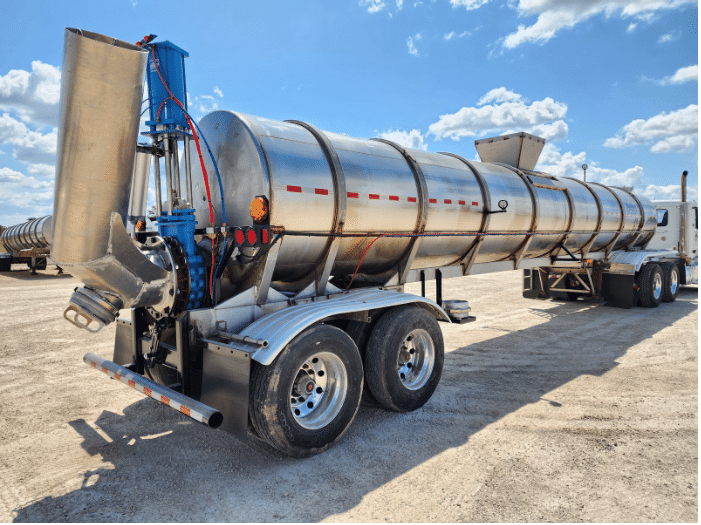The Role of a Manure Tanker for Sale in Large-Scale Farming Operations

A durable stainless steel manure tanker engineered for high-volume hauling and precision nutrient delivery.
Manure Tanker
As farms have grown in size and complexity, there has been a need for efficient manure management. Manual hauling and outdated spreaders can no longer keep up with the volumes produced by modern dairies and livestock operations. Today’s manure pumping equipment and manure tankers are engineered to handle the challenge—moving and applying liquid manure safely, efficiently, and on schedule. A Manure Tanker for Sale isn’t just another piece of machinery—it’s a key tool in turning waste into a valuable crop nutrient source.
Why Manure Tankers Matter on Large Farms
Smaller farms can often rely on direct pumping systems or dragline setups, but large-scale operations frequently need mobile transport to cover greater distances between barns, lagoons, and fields.
A manure tanker makes it possible to haul thousands of gallons per load, moving manure from storage to application sites quickly and efficiently. By reducing travel time and manual handling, tankers keep manure moving when timing is critical—especially during short weather windows for spreading.
For custom applicators and large dairies, manure tankers are a vital part of a complete system that integrates pumping, agitation, and field application into one smooth operation.
Saving Time and Reducing Labor Costs
On large farms, time and labor are two of the most valuable resources. Managing manure manually or with smaller equipment simply isn’t practical at scale.
A properly sized manure tanker for sale allows operators to move more gallons per trip—reducing the number of hauls, saving fuel, and minimizing crew hours. Many modern tankers feature power-driven pumps, rear splash plates, or injector toolbars, which allow one operator to load, transport, and apply manure efficiently.
That combination of volume and versatility makes tankers indispensable during peak spreading seasons, helping farms stay on schedule and meet nutrient application deadlines.
Environmental Benefits of Modern Tankers
Today’s tankers do more than move manure—they protect the environment through precision application. Many models are equipped with low-disturbance injection toolbars, flow meters, and rate control systems, allowing farmers to place manure directly into the soil rather than leaving it on the surface.
This injection process:
- Reduces odor and ammonia loss
- Minimizes runoff into waterways
- Preserves nutrients for crop uptake
By turning manure into a controlled, natural fertilizer source, tankers help farms meet both agronomic and environmental goals.

A manure tanker and tractor apply natural fertilizer across fields, promoting soil health and crop productivity.
The Economic Value of Investing in a Manure Tanker
At first glance, a manure tanker for sale may seem like a major purchase—but for large-scale farms, it pays for itself.
Tankers cut labor costs, reduce dependence on chemical fertilizers, and improve timing during application. Consistent nutrient placement also boosts yields and enhances long-term soil fertility.
When properly maintained, a quality tanker can last for many years. The reduced need for synthetic fertilizers and outside hauling services further increases return on investment. That’s why many producers view a manure tanker not as an expense, but as a strategic, revenue-protecting investment in their operation’s future.
Technology and the Future of Manure Tankers
Manure handling continues to evolve with precision technology. The latest tankers feature GPS-based rate mapping, load tracking, and flow monitoring, giving farmers greater control over where and how nutrients are applied.
Some systems integrate directly with pumping equipment and flow meters, allowing applicators to manage everything from agitation to final application in real time. These advancements improve accuracy, reduce waste, and make it easier for large operations to meet compliance standards.
As large-scale farming expands across North America, manure tankers will continue to play a vital role in sustainable nutrient management.
Conclusion
In large-scale agriculture, the role of a Manure Tanker for Sale goes beyond transport—it’s about efficiency, sustainability, and profitability. Tankers save time, lower labor costs, reduce reliance on commercial fertilizers, and improve soil health.
For dairy, beef, and custom application operations, a high-quality tanker is a cornerstone of modern manure management. Investing in the right Manure Pumping Equipment means turning a daily challenge into an opportunity for growth and sustainability.
👉 Ready to see how a Manure Tanker for Sale can improve your operation? Visit Phil’s Pumping & Fabrication to explore durable, field-proven options—built to last and designed for today’s largest farms. Follow us on Facebook for equipment updates and seasonal specials.
FAQs
- What is the primary role of a manure tanker on a farm?
A manure tanker is used to transport and apply liquid manure from storage to fields. It enables efficient nutrient recycling by delivering natural fertilizer directly where crops need it. - Why are manure tankers essential for large-scale farms?
Large farms produce high manure volumes that can’t be managed manually. A tanker provides the capacity, speed, and control needed to apply manure efficiently and cost-effectively. - Can using a manure tanker improve soil fertility?
Yes. Manure contains vital nutrients like nitrogen, phosphorus, and potassium. Properly applied with a tanker, it enhances soil fertility and supports healthier crop yields. - Are modern manure tankers environmentally friendly?
Yes. Modern tankers with injection systems or low-disturbance applicators reduce runoff, odor, and nutrient loss—helping farms maintain environmental compliance. - Is purchasing a manure tanker a good investment?
Absolutely. A well-built tanker can last for years, reduce fertilizer and labor costs, and improve operational efficiency—making it one of the most valuable investments for large farms.
